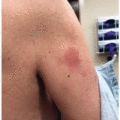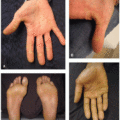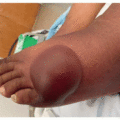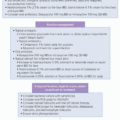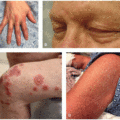PI3-Kinase Inhibitors
Shaiba Sandhu
Ashleigh Eberly Puleo
Nicole R. LeBoeuf
The phosphoinositide 3-kinase (PI3K) pathway is important in cell survival, proliferation, and differentiation1 and is frequently altered in human cancers; thus, PI3K inhibitors (PI3Ki) are used to treat a variety of malignancies, with skin toxicities sometimes associated with specific isoforms. Composed of regulatory and one of four catalytic subunits, PI3K isoforms are expressed either ubiquitously (α, β) or on hematopoietic cells of the adaptive immune system (γ, δ).2 Inhibitors include pan-class I PI3K inhibitors, isoform-specific class I PI3K inhibitors, and dual PI3K-mechanistic target of rapamycin (mTOR) inhibitors. Examples of approved alpha inhibitors include alpelisib and taselisib; δ inhibitors include idelalisib and duvelisib.
“Rash” with PI3Kα inhibitors is reportedly common, affecting 36% of patients, with 10% experiencing high-grade rash in trials.3 Described as maculopapular, this toxicity has not yet been further classified in the literature. Patients present with pink morbilliform or urticaria-like papules (Figure 31.1). This generally fades over 1 to 2 weeks without intervention. In the absence of severe symptoms, rechallenge can be considered with prophylactic antihistamines on board. This may prevent or diminish the development of toxicity, suggesting a mechanism possibly via histamine-releasing pathways.
PI3Kγ/δ and pan-PI3K inhibitors have been reported to induce specific toxicities of psoriasis (Figure 31.2) and a pityriasis rubra pilaris (PRP)-like eruptions, including erythroderma (Figure 31.3)4,5 (Figure 31.4). Inhibition of the delta isoforms depletes circulating T regulatory cells, promoting the effect of antitumor CD8+ T cells.2 Global p110δ inhibition may result in worsening or new autoinflammatory skin disorders such as psoriasis or pityriasis rubra pilaris with dysregulated effector T-cell activation.
Stay updated, free articles. Join our Telegram channel

Full access? Get Clinical Tree


